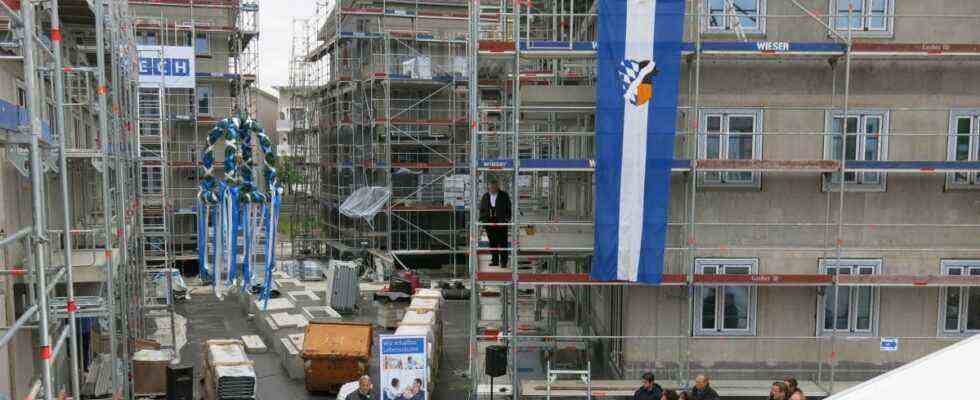Recently a letter with bitter news landed on Karl Scheinhardt’s desk. Once again a building contractor let it be known that his trade could not possibly be completed at the target price: the prices for silicone grouting had risen by 28 percent. The managing director of the Munich-Land construction company knows such letters and can only take note of such messages. As with silicone, the prices of many building materials have only known the way up for months. And yet the construction company based in Haar has the task of building cheaply. For the benefit of the less well-off in the booming Munich region.
In its history, the construction company has often faced the immense task of creating affordable living space for people in need. That was of course the case after the war, when it was founded in 1953. But even in the sixties and seventies, the motto was not only valid for the construction company: Build, build. At that time, large property developers moved up quarters such as the park settlement in Oberschleißheim and the Jagdfeld in Haar. And with the settlement at the forest, Taufkirchen changed from a village to a suburb of Munich.
Karl Scheinhardt is the managing director of the Munich-Land construction company.
(Photo: Florian Peljak)
The construction company, which is supported by the district of Munich and most of its municipalities, always wants to do its bit in the fight against hardship. But this time the situation is special. Land is scarce and more expensive than ever. And construction prices are reaching astronomical heights. The Federal Statistical Office is currently reporting that the prices for new residential buildings increased by 14.4 percent in November 2021 compared to the same month last year. This is the highest increase in a year since August 1970. How should cheap building be possible? “It doesn’t work purely in terms of business figures,” says Karl Scheinhardt.
A small impromptu calculation, not including the property, quickly reveals the dilemma. With an assumed construction price of 5000 euros per square meter of living space, a freelance property developer at current construction prices would, according to Scheinhardt, get a square meter rent of 16 euros instead of the targeted ten euros to finance this. That wouldn’t even deserve much, says Scheinhardt. The construction company, of course, calculates differently. It also reinvented itself a few years ago and no longer builds primarily on its own, but directly as the general contractor of one of the 27 member municipalities. In this way, the municipalities can use the municipal housing subsidy program launched by the Free State, which offers 30 percent subsidies, but only directly to the town halls. Additional grants from the Kreditanstalt für Wiederaufbau (KfW) and cheap loans are added, such as the income-oriented subsidies of the Free State. “The most important thing,” says Scheinhardt, “would be land.” In fact, best provided free of charge by the municipalities.
This construction as general contractor on communal land has meanwhile become the main task of the construction company. In April or May such a residential project will be completed in Planegg with 16 residential units. In the past year there were a total of 137 apartments. Definitely a record-breaking number, as Scheinhardt says. This year this will not be achieved because planning has to be intensified again. A major project with an estimated volume of 17.5 million euros is pending in Ottobrunn, which is being implemented on the construction company’s own property. Because it does not provide any reason, the congregation has increased the capital contribution. In return, she receives the right to occupy the apartments, as is usually the case.
Planning for Ottobrunn is currently underway. But whether everything can be implemented as intended is not so certain, especially because of the building price increases. The tender is due in the first half of the year, and it can bring unpleasant surprises. Scheinhardt does not know how many companies are applying for the trades and at what prices. He does not rule out that he is doing the same thing recently with the community of Haar with their municipal housing company, which had to call off a new construction project at the forest cemetery after two tenders because the construction companies were demanding moon prices. Scheinhardt says: “It may well be that we have to plan completely from scratch.”

